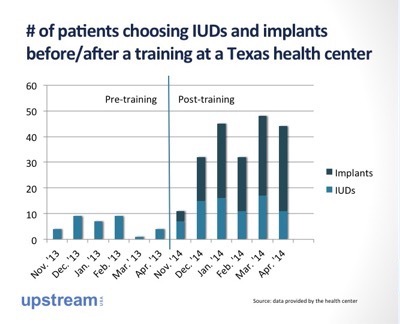There is a lot to celebrate about the stunning reduction in teen pregnancy and abortion rates as a result of Colorado's initiative to reduce unintended pregnancy described in the New York Times. Among other things, the initiative ensured that women in Colorado got access to the most effective forms of contraception, the new IUDs and implants. The Times called the initiative a "startling success," so much so that one wonders, why haven't we seen similar progress elsewhere?
One big reason is that most health centers in the US do not offer their patients same day access to the most effective methods of contraception. What's worse, women aren't told that there are huge variations in effectiveness between methods. According to another New York Times article last year, a woman who uses the pill as her contraceptive method in a typical way for ten years has a whopping 61 percent chance of getting pregnant on average; whereas if she uses one of these new methods - the ones promoted in Colorado - her chances of getting pregnant drop to between 2 percent and 8 percent. Women also aren't told that many tend to prefer these new methods of contraception over the standard contraceptive pill because they don't require remembering to take a pill every day, they can be removed at any time, and women return to fertility faster after stopping than they do with the pill. Yet the few health centers that do offer these methods often require multiple visits and have an outdated understanding of medical eligibility, all of which make it hard even for an educated consumer to get these new, effective methods of birth control endorsed by the Centers for Disease Control and Prevention, American College of Obstetricians and Gynecologists, and the American Academy of Pediatrics as the "first line" methods of contraception for all women.
This lack of access to the most effective methods of contraception translates into incredibly high rates of unplanned pregnancy in the US. According to the most recent data, of the 6.6 million total pregnancies in the US, half were unplanned (3.4 million). Though teen pregnancy rates have dropped, unplanned pregnancy rates have remained essentially flat for 30 years, and have actually gotten worse among women in low-income communities. Many of these pregnancies occur in women who are using a contraceptive method that doesn't work very well for them, and the bulk of these accidental pregnancies are among single women in their twenties. What the initiative in Colorado clearly shows is that if we can help women achieve their own goals and become pregnant only when they want to, we can expect significant cost savings (the US spends about $11 billion annually on medical costs associated with unplanned pregnancy), better health outcomes (when women aren't planning to become pregnant, they may not attend to prenatal care), and better long-term outcomes for women, men, and children. As the Brookings Scholar Isabel Sawhill said, "if we want to reduce poverty, one of the simplest, fastest and cheapest things we could do would be to make sure that as few people as possible become parents before they actually want to."
What can we do to follow Colorado's lead and ensure that all women have access to the latest contraceptive counseling and care? We've learned at Upstream USA that providing the latest technical training for placing these new forms of birth control is crucial. But in order for health centers to be able to offer their patients the full range of contraceptive methods same day, including the most effective ones (IUDs and implants), the health center's systems need to be able to handle same-day coding and billing, scheduling patients properly, and offer informed, patient-centered counseling. Health centers from Upstream's first trainings are reporting that their patients are much more likely to choose one of the most effective methods, they're more satisfied with their contraceptive method choice, and happy clients are returning with their friends in tow.
Ensuring that all women have access to the full range of contraceptive methods, particularly the most effective ones, is the fastest, most easily achievable, most highly leveraged, and least expensive way to ensure that women get pregnant only when they want to, and children are born to parents who plan for them and want them. We should applaud Colorado's leadership in this important effort and hope that it marks the beginning of a cultural shift that recognizes improving contraceptive care is a powerful component of expanding opportunity in America.
Mark Edwards is the co-founder of Upstream USA, a nonprofit focused on breaking the cycle of poverty by helping women achieve their own goals and reducing the incidence of unplanned pregnancy. Previously, Mark served as the founder and executive director of Opportunity Nation.